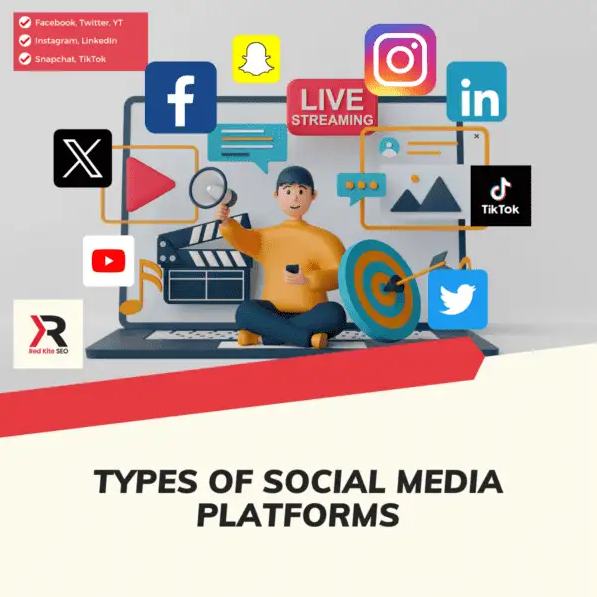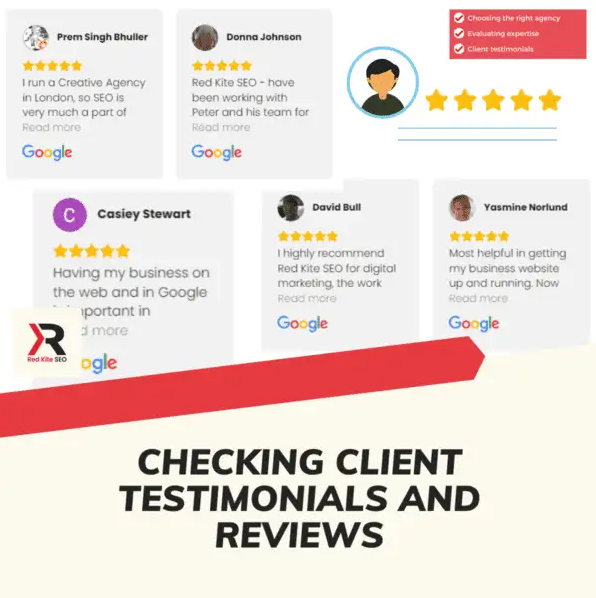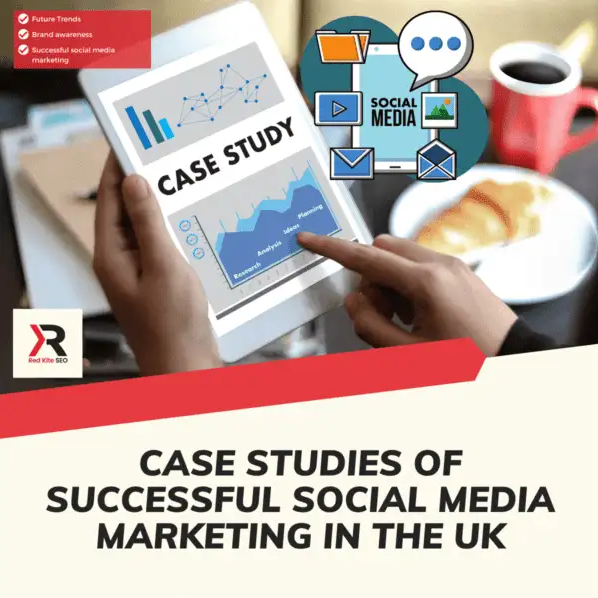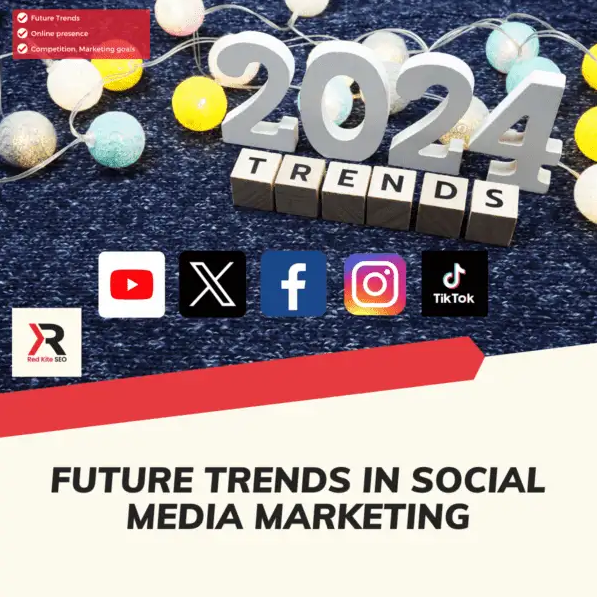Social Media Marketing Agency UK

Are you trying to find a UK-based social media marketing agency? No need to search any further!
Our company is here to guide you through the constantly evolving social media marketing landscape. To help you reach your target audience and improve your internet presence, we provide a variety of services.
We'll assist you in achieving your marketing objectives and staying one step ahead of the competition with our knowledge and innovative techniques.
Don't pass up the chances that social media presents; make us your reliable partner!
Comprehending Social Media Marketing

For organisations today, social media marketing knowledge is essential. It entails making use of numerous social media channels to advertise goods and services, interact with clients, and raise brand awareness.
Meaning and Significance
You need to understand social media marketing's purpose and importance for your company in order to fully appreciate its value.
The technique of using social media platforms to advertise your goods and services and interact with your target market is known as social media marketing. In order to raise brand awareness, improve website traffic, and produce leads, it entails producing and disseminating content on websites like Facebook, Instagram, Twitter, and LinkedIn.
UK social media marketing companies are experts at creating and putting into practise plans that enable companies to make the most of these channels.
It is impossible to overestimate the significance of social media marketing because it enables you to:
In the current digital era, a company's ability to succeed on social media depends on its social media presence.
What Social Media Means for Business
Social media is very important for companies because it lets you market your products and interact with customers in a meaningful way. In order to succeed in the current digital era, companies must have a significant social media presence.
Here's where social media marketing companies can become useful. These companies are experts at creating and putting into practise social media plans that work and support companies in their endeavours. They take care of everything, including managing social media accounts, producing interesting content, and assessing performance indicators.
Types of Social Media Platforms

Let's now discuss the many social media channels that you might use for your marketing campaigns.
Popular platforms like Facebook, Instagram, Twitter, LinkedIn, and YouTube are designed to appeal to a variety of users and provide distinctive features.
Every platform has benefits and drawbacks, so it's critical to comprehend how each functions and which ones best suit your objectives and target audience.
Facebook

On Facebook, you can investigate the various social media networks that are accessible.
It's critical for a UK-based social media marketing business to comprehend Facebook's potential as a channel for connecting with their target market. With more than 2.8 billion monthly active users, Facebook provides a plethora of options for companies to engage with their clientele.
You may use Facebook as a digital marketing agency to generate interesting content and establish a powerful online presence. Facebook offers a range of options for content creation and marketing, from setting up pages and groups to running sponsored posts and targeted ads.
Instagram

Investigating the various social media networks out there, it's critical to check out Instagram as a potent instrument for connecting with your target market.
Users of the popular social media site Instagram can share images and videos with their followers. As a UK-based social media marketing service, Instagram can significantly improve your advertising campaign.
Instagram offers a huge audience to reach, with over one billion users actively using the platform. Because of its visual format, the platform is perfect for engaging product and service showcases. Through the utilisation of Instagram features like stories, IGTV, and hashtags, you may establish a strong connection with your intended audience and increase brand recognition.
Instagram is a great complement to any social media marketing plan due to its widespread use and seamless connection with other social media networks.
Twitter

With its extensive feature set and vibrant user base, Twitter is a great way to connect with your target market. It is imperative for social media marketing agencies in the UK to incorporate Twitter into their social media campaigns.
With more than 330 million active users each month, Twitter offers businesses a special way to interact with their audience by using hashtags, mentions, retweets, and tweets. With focused campaigns, it enables you to develop and market your brand, goods, and services.
The real-time aspect of Twitter (now called X) also makes it a great place to keep up with the newest news and trends. Your agency can improve your clients' social media campaigns and produce significant outcomes by utilising Twitter as a social media channel.
LinkedIn

Your UK-based social media marketing agency may use LinkedIn, another valuable social media platform, effectively. With more than 700 million professionals globally, LinkedIn presents a special chance for you to engage with a very specific audience for your business.
LinkedIn is a valuable tool for social media management agencies to increase brand recognition, lead generation, and thought leadership within their sector. You can efficiently promote your client's goods or services by making an eye-catching corporate profile, posting interesting material, and taking part in pertinent groups and discussions.
By using LinkedIn's advertising tools, like sponsored content and display ads, you may promote your clients' websites and reach a larger audience. You may accomplish your clients' business objectives and improve your agency's overall marketing strategy by integrating LinkedIn into your social media campaign.
YouTube

Developing interesting video content that appeals to your target audience is the key to using YouTube as a social media marketing agency in the UK.
YouTube is an effective tool for expanding your brand's audience and reaching a broad audience. As a UK-based social media marketing company, you may use this platform to:
You can draw in and keep viewers by offering interesting and useful material, which will eventually boost conversions and foster a sense of loyalty among your clientele.
You can efficiently market your business to a wider audience, improve your YouTube channel, and produce engaging social media content with the aid of a social media management service.
Important Services Provided by Social Media Marketing Firms

You should anticipate receiving important services from a social media marketing agency that will improve your internet visibility.
Among these services are:
-
Create a social media plan based on your company's objectives.
-
Producing interesting and pertinent material for your social media accounts.
-
Executing focused marketing initiatives to connect with your intended audience.
-
Taking care of your social media profiles and interacting with fans.
-
Offering statistics and analytics to monitor the success of your social media initiatives.
With the use of these services, the agency will assist you in using social media to develop your brand and produce the desired outcomes.
Development of Social Media Strategies
Creating a solid social media strategy is essential to the success of your company online. Developing a social media plan is one of the main services provided by a UK-based social media marketing agency.
This entails putting together a thorough plan that complements your company's aims and objectives. To create a plan that successfully engages your audience and produces results, the agency will examine your target audience, market trends, and rivals.
They will also assist you with developing a content plan that complements your brand voice and determining which social media channels are best for your company.
To guarantee a unified and effective approach, the firm will help integrate your social media strategy with your complete digital marketing strategy and marketing initiatives.
Content Creation

In the UK, social media marketing companies include content creation as one of their main services.
A social media marketing company is aware of how critical it is to produce content that appeals to your target demographic. Their creative staff is adept at producing engaging content that complements the goals and messaging of your company.
This content can be found in a number of places, such as:
-
Blog posts
-
videos
-
Infographics
-
Social media posts.
To make sure that the content they produce accurately represents your brand identity, the agency's creative team will collaborate closely with you to fully grasp your brand's voice and values.
Social Media Advertising

Let's examine the efficacy of social media advertising as we carry on our conversation about UK social media marketing companies and their main offerings.
One of these companies' main offerings is social media advertising. Businesses have realised the enormous potential of using social media platforms like Facebook, Instagram, and Twitter (X) to reach their target audience.
Businesses may design and manage successful advertising campaigns on a variety of social media platforms with the assistance of a social media marketing firm in the UK. Their proficiency lies in comprehending the nuances of every platform and capitalising on social media's potential to enhance brand recognition, augment website traffic, and produce leads.
These companies also help organisations get the most out of their social media advertising by offering services including ad development, targeting, optimisation, and measurement.
Social Media Management

Comprehensive social media management services are what to expect from a UK-based social media marketing organisation.
An essential component of every digital marketing campaign is social media management.
These companies will manage all of your social media accounts, making sure that your target market is engaged with your company and that it is well-represented.
They'll plan and produce material, keep an eye on messages and comments, reply to them, and evaluate the success of your social media marketing.
"You can concentrate on other areas of your business while knowing that your social media presence is in capable hands when you entrust your social media management to a professional agency."
Social media marketing companies in the UK can help you make the most of your online presence and produce significant outcomes for your company with their experience.
Analytics and Reporting

As a client, you can anticipate gaining from the analytics and reporting know-how of a UK social media marketing business. These agencies analyse the effectiveness of your social media efforts using a variety of tools and approaches because they recognise the value of making decisions based on facts.
They give you comprehensive statistics that show important metrics, such as conversion rates, reach, and engagement rates, so you can assess how well your campaign is working.
They assist you in making well-informed decisions about how to enhance your social media strategy by providing insights and recommendations based on the data collected. Social media marketing companies in the UK make sure you can accomplish your media management and performance marketing objectives by providing you with a comprehensive insight into your social media performance through their proficiency in analytics and reporting.
The advantages of reporting and analytics:
-
Data-driven decision-making
-
Measuring campaign effectiveness
-
Identifying key metrics
-
Insights and recommendations
-
Optimising your social media strategy
Leading UK Social Media Marketing Agency

Are you trying to find the best UK-based social media marketing companies?
Let's examine some agency profiles, specialisations, and well-known clientele in more detail.
You may use this data to help you choose the best agency for your social media marketing requirements.
Agency Profiles
Examine the profiles of the leading social media marketing companies in the UK to gain insight into their environment. The following five companies provide outstanding services for social media marketing:
Agency A: Helping businesses establish a strong online presence and successfully engage with their target audience, Agency A has a team of professionals in social media strategy and content generation.
Agency B: Focusing on influencer marketing, Agency B links clients with well-known figures to develop powerful social media campaigns that increase brand recognition and foster consumer interaction.
Agency C: Distinguished by its data-centric methodology, it employs sophisticated analytics to monitor campaign efficacy and refine social media tactics to optimise outcomes.
Agency D: With a strong emphasis on storytelling, Agency D creates engrossing tales that connect with viewers and support brands in gaining devoted social media fans.
Agency E: This company provides all-inclusive social media management services, handling all aspects from scheduling and content development to community administration and performance monitoring.
These companies offer a small sample of the dynamic social media marketing scene in the UK; each offers their special knowledge to support companies in their digital endeavours.
Regardless of your requirements—influencer partnerships or data-driven tactics—there is a social media agency out there that can meet them.
Specialisations and Notable Clients
Examine the significant clients and areas of expertise of the leading UK social media marketing companies.
These companies are experts in their fields when it comes to social media marketing, having helped numerous companies establish their online identities and successfully interact with their target markets.
These agencies possess the expertise to produce outstanding outcomes in advertising campaigns, content creation, and strategic planning.
Some of the renowned companies that these agencies have worked with are household names across a range of sectors.
These agencies have effectively worked with well-known brands in a variety of industries, including technology, hotels, fashion, and beauty, to develop powerful social media campaigns that raise brand recognition, improve traffic, and boost conversions.
In the field of digital marketing, they are known for being reliable partners because of their capacity to comprehend the objectives of their clients and provide customised social media plans.
These companies stand out in the competitive field of social media marketing. Thanks to their expertise, creativity, and amazing clientele.
How to Pick a Reputable Social Media Marketing Agency
As you select a social media marketing agency, it is important to first determine what your company requires.
Examine the agency's level of experience and inquire about any prior exposure to your sector. To gain an idea of their performance history, look through customer endorsements and reviews. Think about the agency's pricing models and your budget.
Recognising the Needs of Your Business
Determine your company's aims and objectives in order to select the ideal social media marketing company.
Knowing what your company needs from a social media marketing agency is essential. Assess your marketing plan first, then decide what you hope to accomplish with social media. Take into account your intended audience's platform preferences.
Seek out social media marketing firms that are knowledgeable about your target market and have experience in your sector. A competent firm will assist you in creating a customised marketing strategy that supports your company's objectives. They ought to be well-versed in your sector and capable of offering their skills in social media campaign management and interesting content creation.
Evaluating Agency Expertise
You should seek out a business that has experience in your sector and a thorough grasp of your target market in order to select the best social media marketing firm. An effective technique to assess an agency's level of experience is to look through their portfolio and customer reviews.
See if case studies from your sector have assisted companies that are comparable to yours in a successful manner.
Examine their online persona and activity on social media. A respectable firm ought to have a robust and dynamic social media presence that highlights their expertise in the industry.
In order to comprehend your market and find commercial chances, a competent agency will also analyse its competitors.
Checking Client Testimonials and Reviews
You need to read customer reviews and testimonials before selecting the best social media marketing company. You can learn a lot about the agency's experience and calibre of work by reading what former clients have to say about it.

Seek out social media companies with satisfied clients; these are signs of success and great contentment. Reviews can offer more information on the professionalism, punctuality, and communication of the agency as a whole. Take note of any unfavourable evaluations as well, since they can point up any warning signs or places to be concerned about.
Investing effort in finding and examining customer references and evaluations can assist you in choosing a reputable and successful social media marketing company.
Considering Budget and Pricing Models
After looking through customer endorsements and reviews, the next thing to do is figure out which social media marketing agency best suits your demands by taking into account your budget and the various pricing tiers available.
It's critical to choose a social media agency that fits within your budget while making this decision. To find the most value for your money, take the time to compare the price structures of several marketing firms and social media businesses. Some agencies may charge a flat fee for their services, while others may use a tiered pricing structure based on the level of service required.
Remember that costs can change based on your company's size and the particular objectives of your social media marketing strategy.
Case Studies of Successful Social Media Marketing in the UK

Let's now examine some actual instances of social media marketing that have been successful in the UK.
In Case Study 1, you can see how a well-known clothing brand increased their online sales by 30% by using influencer partnerships and targeted advertisements.
Case Study 2 In just three months, a local bakery increased its Instagram following by 50%. Thanks to innovative content and interaction tactics.
Case Study 3 demonstrates how a tech startup raised money for their ground-breaking invention by using viral campaigns and user-generated content to create buzz.
You can learn a lot from these case studies and get ideas for your own social media marketing campaigns.
Case Study 1
Data-driven analysis, consistent interaction, and strategic planning are necessary for social media marketing success.
In case study 1, we'll examine a social media campaign that a UK-based social media marketing company ran successfully. To achieve outstanding results, this agency combined audience engagement techniques, unique content, and targeted advertising.
The firm was able to create content that spoke to the interests and preferences of their target audience by carrying out in-depth research on them. By leaving comments, striking up discussions, and setting up interactive competitions, they constantly engaged their audience.
Through data-driven analysis and close campaign performance monitoring, the agency optimised its plans to maximise reach and engagement in real time.
This case study is a useful illustration of how a UK-based social media marketing agency may successfully increase audience engagement and achieve success by implementing well-thought-out social media campaigns.
Case Study 2
Let us now examine another case study to further examine effective social media marketing in the United Kingdom.
In this case study, we'll examine the outcomes of social media campaigns carried out by a reputable UK social media marketing agency. Like a lot of other digital marketing businesses, this one is aware of the importance of social media in the modern corporate environment.
The agency's partnership with a well-known fashion company is the main subject of the case study. Through the effective utilisation of diverse social media platforms, including Instagram and Twitter, the agency was able to raise brand visibility, engagement, and sales. To successfully reach the brand's target audience, they developed engaging content, made use of influencer partnerships, and put targeted advertising methods into practise.
The agency significantly increased the fashion brand's website traffic, followers, and conversions with their creative social media campaigns.
This case study demonstrates the effectiveness of a properly implemented social media marketing plan as well as the know-how of UK digital marketing firms.
Case Study 3
We'll examine another effective social media marketing effort in the UK and its effects on a particular industry.
Five important lessons can be learned from this case study:
-
A UK-based social media marketing agency employed focused tactics to connect with the intended demographic.
-
Through the use of social media platforms, they generated interaction and brand exposure.
-
The campaign yielded notable results in terms of website traffic and lead generation.
-
The agency employed data analytics to assess the efficacy of its social media marketing endeavours.
-
By means of captivating content and well-crafted messaging, they effectively forged connections with their intended audiences and accomplished their marketing objectives.
This case study illustrates the substantial influence that social media marketing tactics can have on UK firms, propelling expansion and prosperity in the digital era.
Future Trends in Social Media Marketing

You need to take into account a few major trends when predicting the direction of social media marketing in the future.
First, new social media platforms are always developing, providing businesses with fresh ways to engage with their audience.
More focused and customised campaigns are made possible by the growing importance of AI and machine learning in social media marketing.
It is impossible to overlook how data privacy laws affect social media marketing, since more stringent laws may force companies to modify their tactics and guarantee compliance.
Emerging Social Media Platforms
To stay ahead of upcoming trends in social media marketing, you can investigate a variety of newly developed social media sites.
It's critical for a UK-based social media marketing business to understand these sites and how they might affect your marketing plans.
TikTok is one such new platform that has become very popular with younger audiences. TikTok is a special chance for companies to communicate and have fun with their audience through short-form films and creative features.
Clubhouse is a social networking software that is based on audio and lets users share their knowledge and take part in live debates. It's another platform to keep an eye on.
The Role of AI and Machine Learning in Social Media Marketing

As a social media marketing agency in the UK, stay ahead of the curve in social media marketing by knowing how AI and machine learning fit into your plans.
The way firms handle social media marketing is being revolutionised by AI and machine learning technologies. Large volumes of data from social media platforms can be analysed by this cutting-edge technology, giving agencies insightful knowledge on the tastes and behaviours of their clientele.
Social media marketing companies in the UK may improve client interaction, tailor content, and maximise their advertising efforts by utilising AI and machine learning. Artificial intelligence (AI)-driven chatbots can offer immediate customer assistance, enhancing response times and general customer happiness.
Additionally, agencies can use machine learning algorithms to find patterns and trends in social media data, which will help them remain ahead of the competition and make data-driven decisions.
In order to thrive in the current digital environment, social media marketing companies in the UK must embrace AI and machine intelligence.
The Impact of Data Privacy Regulations on Social Media Marketing
When navigating future trends in business, social media marketing agencies in the UK must take into account the impact of data privacy legislation on social media marketing.
Governments all over the world are enacting stricter laws to protect consumers as concerns about the security and privacy of personal data grow. These restrictions have a significant impact on the way social media marketing companies gather, store, and use data for targeted advertising campaigns.
Following data privacy laws is important for maintaining consumer trust as well as ensuring legal compliance. Agencies must get users' express consent and be open and honest about the data they gather.
Brands and consumers will probably engage in more meaningful and contextually relevant ways on social media platforms as a result of this change towards a more privacy-focused strategy.
Frequently Asked Questions
What Are the Potential Risks and Challenges of Implementing a Social Media Marketing Strategy?
Implementing a social media marketing strategy comes with potential risks and challenges. You may face issues like negative feedback, brand reputation damage, and privacy concerns. However, with proper planning and monitoring, you can overcome these obstacles and achieve success.
How Can Social Media Marketing Agencies Help Businesses Target Their Desired Audience Effectively?
To effectively target your desired audience, social media marketing agencies can help you by utilising their expertise in identifying and understanding your target market, creating tailored content, and implementing strategic advertising campaigns.
What Are Some Common Misconceptions About Social Media Marketing That Businesses Should Be Aware Of?
Some common misconceptions about social media marketing that you should be aware of include thinking it’s only for young people, that it’s a quick fix for success, and that you don’t need a strategy.
Can You Provide Examples of Social Media Campaigns That Have Had a Significant Impact on a Business’s Success?
You can find many examples of social media campaigns that have significantly impacted businesses’ success. These campaigns have reached a wide audience, increased brand awareness, and driven sales, proving the power of social media marketing.
Are There Any Regulations or Legal Considerations That Businesses Need to Be Aware of When Conducting Social Media Marketing in the UK?
When conducting social media marketing in the UK, businesses need to be aware of various regulations and legal considerations. It is important to comply with data protection laws, advertising standards, and copyright regulations to avoid any legal issues.